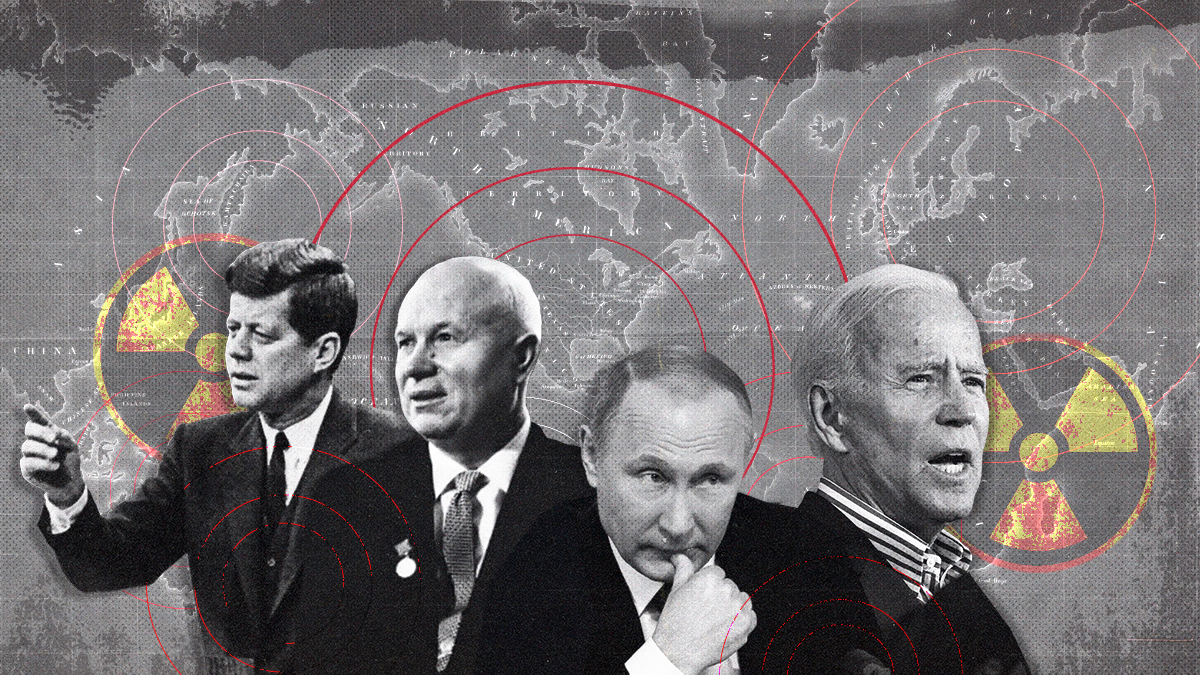October 13, 2022
Sixty years ago on Friday, Maj. Richard Heyser took hundreds of photos of suspicious installations in the Cuban countryside from a US spy plane. Close inspection of the photos back in Washington revealed that the Soviet government, then led by Nikita Khrushchev, had secretly installed missiles capable of carrying nuclear warheads over 90 miles of ocean to hit targets across much of the United States. You can hear audio recordings of the initial White House discussion of this threat here.
Over the following days, the White House and Kremlin found themselves looking for ways to avoid nuclear war. The crisis was resolved when a deal was reached that pulled the Soviet missiles from Cuba and later withdrew US missiles from Turkey.
Today, a Kremlin leader has created a new crisis. A Russian invasion has produced a military stalemate in the south and east of Ukraine. President Vladimir Putin has warned that nuclear weapons remain an option for Russia if he believes his country’s national security is threatened. Other Russian officials and allies have issued more explicit threats. President Joe Biden has invoked “the prospect of Armageddon” and spoken about lessons from the Cuban Missile Crisis that might help avert catastrophe today.
In some ways, the 1962 nuclear face-off was more dangerous than the current standoff. Sixty years ago, the threat of nuclear attack was made against the territory of the United States, a nuclear-armed superpower that would have retaliated instantly against attack. Millions of Americans and Soviets would have been killed within minutes. Today, most of the specific Russian threats center on so-called tactical nuclear weapons for use on the battlefield in Ukraine. Their effect would be horrific, but the scale of destruction would be much smaller than an attack on the US in 1962 – unless retaliation against a Russian strike provoked escalation.
In addition, communication between Washington and Moscow, crucial in any potential military confrontation, was more complex in 1962. Then, it took hours for secure communications to reach the other side, increasing the risk of miscalculation and deadly accidents while leaders waited for responses. And President John Kennedy faced an especially dangerous problem 60 years ago: It was not clear who was in charge in the Kremlin. Contradictory messages from Moscow led some in Washington to fear that Khrushchev had been removed from power and that the US faced an unknown adversary in a potentially unstable situation.
But in other ways, it’s the current standoff that’s more dangerous. The Cuban missile crisis took place just 17 years after the end of World War II. The devastating consequences of war were lived experience for leaders on both sides. Today, 77 years after the end of the last global war, the destructive potential is more abstract. It’s possible to be complacent about a threat no one has faced in decades.
Second, the crisis over Cuba occurred in peacetime, while today’s Russia finds itself in a shooting war in which the United States is very much involved. As a result, there are other players in today’s drama. The risk that an action taken inside Ukraine could send nuclear forces onto high alert adds a layer of complexity that didn’t exist in 1962.
Finally, we now know that Kennedy and Khrushchev were able to communicate through a back channel that even senior US and Soviet officials didn’t know about. Secret negotiations between Attorney General Robert Kennedy and Soviet ambassador Anatoly Dobrynin were crucial for averting catastrophe and building a deal. Today’s White House and Kremlin may have their own backchannel to avoid nuclear war, but it may be years before details emerge on the quality of that communication.
US President Ronald Reagan and Soviet leader Mikhail Gorbachev agreed that “a nuclear war cannot be won and must never be fought.” But for now, Russian leaders are determined to project strength and confidence at the expense of any hope of reconciliation. Ukraine’s government refuses to compromise on control of its territory, and Ukraine’s backers in Europe and the United States know that surrender to nuclear blackmail sets a dangerous precedent that makes the world less, not more, secure.
US and Soviet leaders resolved the Cuban missile crisis through flexibility and creativity on both sides. Today, there’s no sign of any such solution.
This article comes to you from the Signal newsletter team of GZERO Media. Sign up today.
More For You
Most Popular
With the US leading production and China driving new reactor development, Bank of America breaks down the who, what, where, when, and why behind nuclear’s return. Stay ahead of global energy trends with Bank of America Institute.
Chris, an Army veteran, started his Walmart journey over 25 years ago as an hourly associate. Today, he manages a Distribution Center and serves as a mentor, helping others navigate their own paths to success. At Walmart, associates have the opportunity to take advantage of the pathways, perks, and pay that come with the job — with or without a college degree. In fact, more than 75% of Walmart management started as hourly associates. Learn more about how over 130,000 associates were promoted into roles of greater responsibility and higher pay in FY25.
Last week, at the Munich Security Conference, a group of global technology providers, including Microsoft, announced the Trusted Tech Alliance — committed to shared, verifiable principles for trusted, transparent, and resilient technology across borders. At a moment of economic volatility and zero-sum technological competition, countries and customers are demanding greater accountability from technology providers. The Alliance addresses this by bringing together companies from across Africa, Asia, Europe, and North America around shared commitments: transparent governance, secure development practices, supply chain oversight, open digital ecosystem, and respect for the rule of law — ensuring the benefits of emerging technologies strengthen public trust while driving job creation and economic growth. Explore the Trusted Tech Alliance here.
© 2025 GZERO Media. All Rights Reserved | A Eurasia Group media company.
